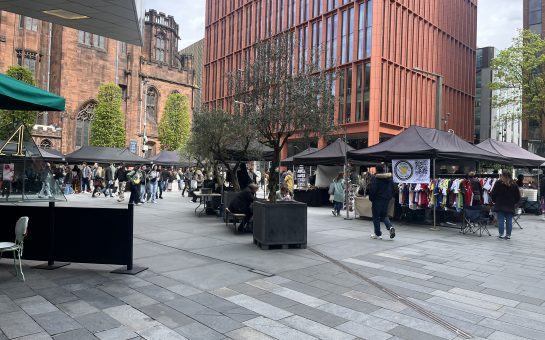By James Metcalf, watching at Manchester’s Cornerhouse
A film of unimpeachable integrity, Museum Hours deals with the profundities of art, age, loss and the darkness beyond.
The latest film by documentary-maker Jem Cohen – recipient of the prestigious Independent Spirit Award for filmmaking – sees Canadian Anne (played by singer-songwriter Mary Margaret O’Hara) descend reluctantly on the capital of a bleak, winter-struck Austria.
Forced to face the sudden coma of her cousin, she turns to a sympathetic guard at the Viennese Museum of Art History – Johann (played by Bobby Sommer) – and finds a surprise kindred spirit.
As Anne and Johann discover the inner beauty of a city struck by the inherent moroseness of winter, the audience is confronted with the filmic love-affair with Vienna.
As the characters roam the streets in silent awe, the camera pans variously to dramatic landscapes and the minutiae within, thereby convincing the audience that sometimes words are simply not enough to convey the grief of human isolation, or indeed what is required to overcome such solitude.
Museum Hours is principally concerned with missing pieces – the want of family or friends of either protagonist, the lack of warmth in the city, and several striking shots of ancient, defaced sculptures come together to draw attention to this motif.
And so it seems right that Anne finds Johann (note the symmetry of the names) at a time when loneliness is all she has, in a city she will forever associate with loss.
On the face of it there is a haunting morbidity to the film, but one has only to look a little deeper – as is the case with all great art – to see a glimmer of light beneath the darkness. Johann learns to take solace in the quiet simplicity of his work, while Anne finds a peculiar sort of comfort in reminiscing with her lifeless cousin.
There are poignant moments falling over each other in Museum Hours, but there is one in particular that will form a near-magical lasting image. Anne sings to her cousin, and as night falls, casting darkness on her face, she continues her dirge, mourning the loss of her cousin and her life as she thought it would turn out to be.
Such affecting melancholy continues in the art at the museum. To occupy her wandering mind, Anne takes to visiting Johann on his shifts, and they each gaze longingly at what remains of former lives now come to an end.
Art, the film tells us, is a lasting imprint of humanity when all other vestiges of life are gone. This message, however, is neither moralising nor didactic; rather, it is conciliatory, both for the film’s characters and its audience.
Quite simply, the film is enrapturing. It seems to adulate in its maudlin sense of quietude, while presenting a compellingly heartfelt ideal of the joy to be found in life’s simplicities. From this it seems clear that Museum Hours is, if nothing else, a film of deep emotional complexity.
Museum Hours is most assuredly not one to miss.
Museum Hours is now showing at Manchester’s Cornerhouse. Visit here for more information.
Picture courtesy of The Cinema Guild via YouTube, with thanks.
For more on this story and many others, follow Mancunian Matters on Twitter and Facebook.



